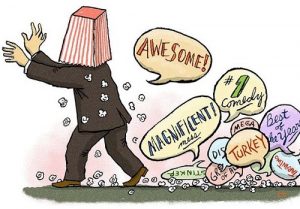I will not lie: it took me longer to come up with that title than it did to write the article. I am not even sure it conveys the right meaning I intended (is it “polysyllabic” or “poly-syllabic”? Is that even a word?). But, as you read the article, you will see where I am going with this.
I like movies. Always have. When I see a good movie, I will but the DVD and watch it over and over again. When I started blogging, I decided to write movie reviews so that I could spread the word when I saw something, I thought, was really good. My hopes are that one person reads my review and it spurs enough interest that that person will actually watch the movie. I average about fifty views every time and I am sure someone is watching the movie based on my review.
I used to love reading about movie reviews. I would watch Siskel and Ebert (may the rest in peace) every Saturday when I was younger. I may never have seen the movies, but at least I knew what I wanted to see. This was before the Internet so just typing in a movie title and letting the critics opinions pour in was not an option. I loved those two because they basically said if they liked or disliked the movie and why. Sometimes, they disagreed and would get into an argument (I trusted Ebert’s opinions more than Siskel’s). But, either way, there critiques were short, to-the-point and understandable.
Then, the Internet. Rottentomatoes.com came around and I was able to get an overview of all the movies. Again, it was a great resource. Just about every legitimate movie reviewer (from television or newspapers) were listed. I could see what a majority liked and read some of the opinions.
But, now, the movie review has gone to hell-and-a-hand-basket. Everybody, and their mother, has become a film critic. Every blogger and YouTube publisher gives their opinion. What is worse, you can tell that these reviewers are trying to stand out from the rest of the flock. How do they do that? String together huge, impressive sounding words when being critical. Listen, I have a degree in literature, read a couple of books a month, have written two books (not published, ugh!) and write on a daily basis. I am not Mark Twain or anything but, if I do not understand what you are saying, there is something wrong with your criticism.
When I read the reviews for Star Wars: A Force Awakens, I was looking at the negative reviews (it actually had a 92% fresh rating, so I was going to see it anyway) since I wanted to read what these folks did not like about it. Here is what I read.
Richard Brody – The New Yorker
“Despite the copious servings of tragic threats and good feelings, the production sinks under the weight of its emotional calculation.”
What the f***! I had to read this three times before I understood what the hell this guy was talking about. Hey, Dick, let me help you out. Next time, just say this and people will understand what you are saying:
“The writers and director of Star Wars: The Force Awakens tried to hard to make it a Star Wars film” -qezzit
I just said the same thing he did but you do not need any critical thinking to figure it out. I felt like I was translating a different language to English. Then there is this one…
Roger Tennis – Cinemaclips.com
“…dazzles audiences with a surface of nostalgic fun made shiny new-but beneath that mask, if you care to notice it, lurks an abyss of futility.”
All those syllables and and metaphors and all he was saying is that it was not as good as the last Star Wars movies. Let me help Roger out:
“Star Wars: The Force Awakens was not as good as the other Star Wars films.” -qezzit
Look at that! I said what Roger said but there is no need for an anthropological linguist to figure out what was written.
Now, the last one. This one is a brain-screw. I hope none of my readers have seizures after reading this…
Cole Smithey – Colesmithey.com
“This latest installment of fandom’s favorite mongrel pet is a poorly paced MacGuffin-chase plot, ginned up with groan-inducing spoonful doses of pro-war imagery and its attendant rudimentary vocabulary.”
I did not even bother trying to figure this one out. I mean, yes, the metaphors are way out there. But that is not the problem with this one. If I have to go to wikipedia.com to figure out what a film critic is trying to say (what the hell is a “MacGuffin”?), I will just pass. I have to be honest with you: did he or did he not like the movie? If it were not for the splatter mark in front of his review, I would not be sure. Cole should trust he is smart and not try to prove it when reviewing Star Wars.
This is what I promise you: my reviews will be easy to understand, to the point and honest. You will not need a doctorate in linguistics to understand that I like or dislike a movie. With that off my chest, I feel better.
Picture courtesy of:
priceonomics.com
marketwatch.com
mediastinger.com
twitter.com
phoenixfilmcriticssociety.org
Colesmithey.com







